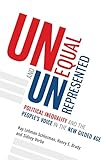Unequal and Unrepresented : Political Inequality and the People's Voice in the New Gilded Age / Sidney Verba, Kay Lehman Schlozman, Henry E. Brady.
Material type: TextPublisher: Princeton, NJ : Princeton University Press, [2018]Copyright date: ©2018Description: 1 online resource (352 p.) : 36 b/w illus., 19 tables, 5 mapsContent type:
TextPublisher: Princeton, NJ : Princeton University Press, [2018]Copyright date: ©2018Description: 1 online resource (352 p.) : 36 b/w illus., 19 tables, 5 mapsContent type: - 9780691180557
- 9781400890361
- 328.73 23
- JK1021
- online - DeGruyter
- Issued also in print.
| Item type | Current library | Call number | URL | Status | Notes | Barcode | |
|---|---|---|---|---|---|---|---|
 eBook
eBook
|
Biblioteca "Angelicum" Pont. Univ. S.Tommaso d'Aquino Nuvola online | online - DeGruyter (Browse shelf(Opens below)) | Online access | Not for loan (Accesso limitato) | Accesso per gli utenti autorizzati / Access for authorized users | (dgr)9781400890361 |
Browsing Biblioteca "Angelicum" Pont. Univ. S.Tommaso d'Aquino shelves, Shelving location: Nuvola online Close shelf browser (Hides shelf browser)

|

|

|

|

|

|

|
||
| online - DeGruyter The Impossibility of Religious Freedom : New Edition / | online - DeGruyter Humanity / | online - DeGruyter Misdemeanorland : Criminal Courts and Social Control in an Age of Broken Windows Policing / | online - DeGruyter Unequal and Unrepresented : Political Inequality and the People's Voice in the New Gilded Age / | online - DeGruyter What School Could Be : Insights and Inspiration from Teachers across America / | online - DeGruyter American Default : The Untold Story of FDR, the Supreme Court, and the Battle over Gold / | online - DeGruyter The Analects : An Illustrated Edition / |
Frontmatter -- Contents -- Preface -- Acknowledgments -- Introduction -- PART I -- What Do We Mean by Political Voice? Does Equal Voice Matter? -- The Roots of Citizen Participation: The Civic Voluntarism Model -- PART II -- Who Exercises Political Voice? -- The Noisy and the Silent: Divergent Preferences and Needs -- Do Digital Technologies Make a Difference? -- Social Movements and Ordinary Recruitment -- PART III -- Who Sings in the Heavenly Chorus? The Shape of the Organized Interest System -- Representing Interests through Organizational Activity -- PART IV -- Growing Economic Inequality and Its (Partially) Political Roots -- Has It Always Been This Way? -- Can We Do Anything about It? -- Unequal Voice in an Unequal Age -- Notes -- Index
restricted access online access with authorization star
http://purl.org/coar/access_right/c_16ec
How American political participation is increasingly being shaped by citizens who wield more resourcesThe Declaration of Independence proclaims equality as a foundational American value. However, Unequal and Unrepresented finds that political voice in America is not only unequal but also unrepresentative. Those who are well educated and affluent carry megaphones. The less privileged speak in a whisper. Relying on three decades of research and an enormous wealth of information about politically active individuals and organizations, Kay Schlozman, Henry Brady, and Sidney Verba offer a concise synthesis and update of their groundbreaking work on political participation. The authors consider the many ways that citizens in American democracy can influence public outcomes through political voice: by voting, getting involved in campaigns, communicating directly with public officials, participating online or offline, acting alone and in organizations, and investing their time and money. Socioeconomic imbalances characterize every form of political voice, but the advantage to the advantaged is especially pronounced when it comes to any form of political expression--for example, lobbying legislators or making campaign donations-that relies on money as an input. With those at the top of the ladder increasingly able to spend lavishly in politics, political action anchored in financial investment weighs ever more heavily in what public officials hear. Citing real-life examples and examining inequalities from multiple perspectives, Unequal and Unrepresented shows how disparities in political voice endanger American democracy today.
Issued also in print.
Mode of access: Internet via World Wide Web.
In English.
Description based on online resource; title from PDF title page (publisher's Web site, viewed 27. Sep 2021)


